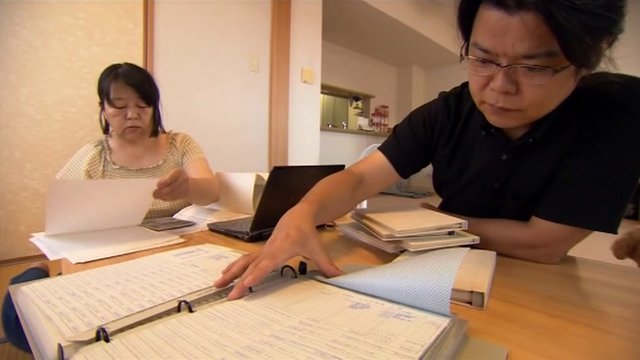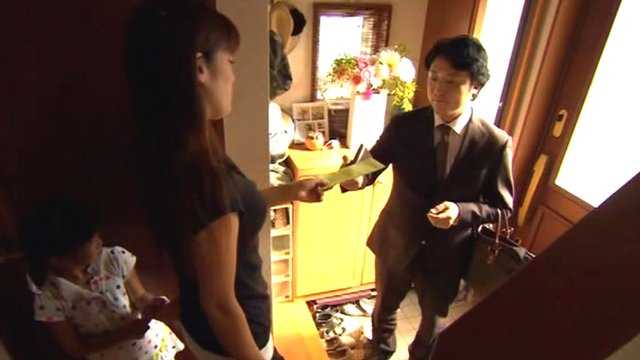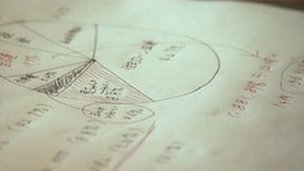Mtoboasiri
JF-Expert Member
- Aug 6, 2009
- 5,101
- 1,946
[h=1]Why male Japanese wage-earners have only 'pocket money'[/h]
 By Mariko Oi BBC News, Tokyo
By Mariko Oi BBC News, Tokyo

Mariko Oi reports on the 74% of Japanese household budgets that are controlled by women
The 15th of each month is a big day for 36-year-old Yoshihiro Nozawa: it is the day he gets paid.
But every month, he hands over his entire salary to his wife Masami. She controls the household budget and gives him a monthly pocket money of 30,000 yen ($381; £243). Despite being the breadwinner, that is all the money he can spend on himself over the next 30 days.
"The last five days from the 10th of each month are usually the toughest," says Yoshihiro. To put the amount of his pocket money into context, the Nozawa family of four could easily spend 30,000 yen at Tokyo Disneyland in a day.
Yoshihiro and Masami have two children, Rino aged 6 and Ren aged 8, and they are the reason his wife decided to put him on a fixed allowance.
"I started controlling the household budget when I became a housewife after having children," says Masami. "Suddenly, there was only one income and their educations and private lessons cost a lot." Yoshihiro nods but he says 30,000 yen doesn't go far in the world's most expensive city, Tokyo.
"She makes me a lunch box every morning so that helps a lot," he says as he eats his lunch alone in a nearby park from his office. His only luxury is cigarettes, which he spends one third of his monthly allowance on. "I think I may have to quit if the price goes up again," he says.
Yoshihiro may be eating his lunch alone but he is not unique. According to a survey conducted by research firm Softbrain Field, 74% of Japanese household budgets are controlled by women and it is not just couples with young children.

Yoshihiro Nozawa: "Even if I get a pay rise, I'm not too hopeful that my pocket money will go up as well"
47-year-old Taisaku Kubo has been getting 50,000 yen a month from his wife Yuriko for the past 15 years. He has tried to negotiate a pay rise each year but his wife makes a presentation to explain why it cannot be done.
"She draws a pie chart of our household budget to explain why I cannot get more pocket money," says Taisaku.
On the hand drawn chart, his pocket money is stated as 8.8% of the monthly budget. "The biggest expenditures are home loan and taxes," says his wife Yuriko. "We don't have children so I want to make sure that we'll have enough money after his retirement."
Just like that, Taisaku loses his argument for a pay rise. "I've given up my car, motorbike and many expensive hobbies," he laughs.
Shrinking budget But his monthly allowance of 50,000 yen is in fact higher than the national average. According to Shinsei Bank which has been researching the trend since 1979, the average monthly pocket money was 39,600 yen last year.
And to make things harder for the men, that compares with 76,000 yen in 1990 when people thought that Japan's economy was at its peak. That was one year after the nation's benchmark stock index, the Nikkei 225, reached a record high of 38,916.
But share prices fell sharply in the 1990s and have never since come close to that level.
 Many Japanese household budgets are tightly controlled by housewives
Many Japanese household budgets are tightly controlled by housewives
And just as the performance of Japanese companies deteriorated, businessmen's pocket money fell with it.
So today, those whose wives don't make lunch boxes try to cap their daily lunch budget to one coin: 500 yen - about $6.50. As in most cities, prices vary wildly according to location, decor and the standard of food and drink on offer.
But in many places 500 yen would barely be enough for a bowl of noodles or a McDonald's burger.
Their drinking budget has also shrunk to a record low. On average, they only spend 2,860 yen on a night of drinking which is almost half of what they used to spend just three years ago. That does not allow for a great many half litre bottles of Asahi - the average price is around 700 yen.
Double income So why don't men start controlling the household budgets themselves? "I don't think many men hand over their entire salaries happily," says career consultant Takao Maekawa of FeelWorks. "But they feel it's their obligation to earn money for the family even if it means they have to suffer themselves."
Traditionally, it was a combination of hardworking salarymen, as white-collar businessmen are called in Japan, and stay-at-home mothers or housewives which supported Japan's economic growth after World War II. "He actually tried to handle the household budget once," says Masami Nozawa whose husband Yoshihiro lives on 30,000 yen a month.
"But he said it was too time consuming so returned the task back to me," she says. Yoshihiro agrees: "I know how much I make and I now understand how difficult it is to allocate the money". "Even if I get a pay rise at work, I am not too hopeful that my pocket money will go up."
Today, more families are seeking out a double income simply because they cannot afford not to. But for now, Yoshihiro and Taisaku look for cheap enough bars where they can still have some drinks without blowing all of their monthly pocket money at once.


Mariko Oi reports on the 74% of Japanese household budgets that are controlled by women
The 15th of each month is a big day for 36-year-old Yoshihiro Nozawa: it is the day he gets paid.
But every month, he hands over his entire salary to his wife Masami. She controls the household budget and gives him a monthly pocket money of 30,000 yen ($381; £243). Despite being the breadwinner, that is all the money he can spend on himself over the next 30 days.
"The last five days from the 10th of each month are usually the toughest," says Yoshihiro. To put the amount of his pocket money into context, the Nozawa family of four could easily spend 30,000 yen at Tokyo Disneyland in a day.
Yoshihiro and Masami have two children, Rino aged 6 and Ren aged 8, and they are the reason his wife decided to put him on a fixed allowance.
"I started controlling the household budget when I became a housewife after having children," says Masami. "Suddenly, there was only one income and their educations and private lessons cost a lot." Yoshihiro nods but he says 30,000 yen doesn't go far in the world's most expensive city, Tokyo.
"She makes me a lunch box every morning so that helps a lot," he says as he eats his lunch alone in a nearby park from his office. His only luxury is cigarettes, which he spends one third of his monthly allowance on. "I think I may have to quit if the price goes up again," he says.
Yoshihiro may be eating his lunch alone but he is not unique. According to a survey conducted by research firm Softbrain Field, 74% of Japanese household budgets are controlled by women and it is not just couples with young children.

Yoshihiro Nozawa: "Even if I get a pay rise, I'm not too hopeful that my pocket money will go up as well"
47-year-old Taisaku Kubo has been getting 50,000 yen a month from his wife Yuriko for the past 15 years. He has tried to negotiate a pay rise each year but his wife makes a presentation to explain why it cannot be done.
"She draws a pie chart of our household budget to explain why I cannot get more pocket money," says Taisaku.
On the hand drawn chart, his pocket money is stated as 8.8% of the monthly budget. "The biggest expenditures are home loan and taxes," says his wife Yuriko. "We don't have children so I want to make sure that we'll have enough money after his retirement."
Just like that, Taisaku loses his argument for a pay rise. "I've given up my car, motorbike and many expensive hobbies," he laughs.
Shrinking budget But his monthly allowance of 50,000 yen is in fact higher than the national average. According to Shinsei Bank which has been researching the trend since 1979, the average monthly pocket money was 39,600 yen last year.
And to make things harder for the men, that compares with 76,000 yen in 1990 when people thought that Japan's economy was at its peak. That was one year after the nation's benchmark stock index, the Nikkei 225, reached a record high of 38,916.
But share prices fell sharply in the 1990s and have never since come close to that level.

And just as the performance of Japanese companies deteriorated, businessmen's pocket money fell with it.
So today, those whose wives don't make lunch boxes try to cap their daily lunch budget to one coin: 500 yen - about $6.50. As in most cities, prices vary wildly according to location, decor and the standard of food and drink on offer.
But in many places 500 yen would barely be enough for a bowl of noodles or a McDonald's burger.
Their drinking budget has also shrunk to a record low. On average, they only spend 2,860 yen on a night of drinking which is almost half of what they used to spend just three years ago. That does not allow for a great many half litre bottles of Asahi - the average price is around 700 yen.
Double income So why don't men start controlling the household budgets themselves? "I don't think many men hand over their entire salaries happily," says career consultant Takao Maekawa of FeelWorks. "But they feel it's their obligation to earn money for the family even if it means they have to suffer themselves."
Traditionally, it was a combination of hardworking salarymen, as white-collar businessmen are called in Japan, and stay-at-home mothers or housewives which supported Japan's economic growth after World War II. "He actually tried to handle the household budget once," says Masami Nozawa whose husband Yoshihiro lives on 30,000 yen a month.
"But he said it was too time consuming so returned the task back to me," she says. Yoshihiro agrees: "I know how much I make and I now understand how difficult it is to allocate the money". "Even if I get a pay rise at work, I am not too hopeful that my pocket money will go up."
Today, more families are seeking out a double income simply because they cannot afford not to. But for now, Yoshihiro and Taisaku look for cheap enough bars where they can still have some drinks without blowing all of their monthly pocket money at once.